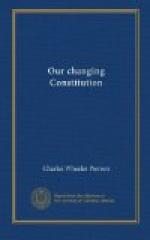VIII
THE FEDERAL TAXING POWER AND THE INCOME TAX AMENDMENT
Had the World War come five years earlier the United States would have been much handicapped and embarrassed in financing its share of the struggle. One of the chief sources of national revenue during and since the war, the income tax, would not have been available. The federal income tax had been declared unconstitutional by the Supreme Court in 1895, and it was not until eighteen years later that the obstacle pointed out by that decision was removed through the adoption of an amendment to the Constitution. The Sixteenth or Income Tax Amendment was proposed by Congress to the legislatures of the several states in 1909 and took effect, having been ratified by three-fourths of the states, in 1913. Declared by its sponsors at the outset to be intended merely as a recourse in case of emergency, the tax authorized by the amendment was at once put into operation and there seems to be little likelihood that it will ever be abandoned.
Without the constitutional amendment no general income tax would be practicable. And yet the amendment conferred no new power of taxation on the National Government. To explain this seeming paradox it will be necessary to consider briefly the scope and limitations of the federal taxing power.
One of the chief defects, perhaps the most vital defect of all, in the Confederation which carried through the Revolutionary War and preceded the Union, was its inability to raise revenue directly by taxation. The Confederation was obliged to call upon the several states to furnish their respective contributions or quotas, and requisitions upon the states encountered delays and sometimes were ignored altogether. There were no effective means of compulsion.
With these facts before them the founders of the Union determined that the new government should not be wrecked upon this rock at any rate, and therefore insisted, against great opposition, in conferring upon it powers of taxation which were practically unlimited in their reach. The Constitution was made to provide that[1]
the Congress shall have
power to lay and collect taxes,
duties, imposts and
excises, to pay the debts and provide for
the common defense and
general welfare of the United States.
[Footnote 1: Const., Art. I, Sec. 8, Clause 1.]
The only tax which Congress was expressly forbidden to lay was a tax on exports.[1] It was, however, provided that indirect taxes (duties, imposts, and excises) should be uniform throughout the United States,[2] and that direct taxes should be apportioned among the states according to population.[3] The last mentioned provision was a concession to the fears of the wealthier states lest their citizens be taxed unduly for the benefit of the poorer states, and represented one of the great compromises by which the ratification of the Constitution as a whole was secured.




